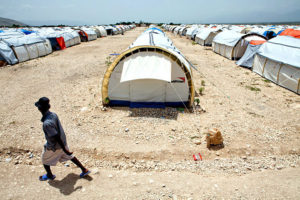
If it weren’t hard enough looking after 2,000 earthquake victims crammed into a sweltering schoolyard, Jean Robert Charles now has to worry about rapists.
Charles is the de facto mayor of a tent settlement that fills a school and a soccer field in the gang-plagued Matisan section of the Haitian capital. A recent series of rapes has created fear in his camp and others nearby, adding crime and safety to the long list of anxieties facing residents displaced by the Jan. 12 earthquake.
“There’s no light. We can’t see. We don’t have any guns. We have only two flashlights,” Charles said.
After the quake, fears of violent unrest gave way to relative calm, aided by a large U.S. military presence during the first months and the addition of 3,500 United Nations peacekeepers and foreign police. Crime was rife in Port-au-Prince before the quake, but international officials say they have kept it largely under control.
Still, the massive dislocation has bred insecurity. About 1.5 million people live in 1,300 camps, bunking next to strangers with no doors to lock.
Criminal gangs that were quiet after the quake are stirring again. Hundreds of gang leaders escaped when the main prison collapsed during the temblor, letting loose more than 4,000 inmates. Even though authorities have arrested more than 830 people, including hundreds of escapees, the criminal gangs are regrouping and growing bolder, officials say.
“They’re not mechanics and carpenters. What they know how to do is be criminals and bandits,” Edmond Mulet, the U.N. secretary-general’s special representative in Haiti, said of the escapees.
Mulet said camp dwellers have reported a variety of offenses, including weapons possession and an increasing number of rapes in a nation already plagued by a high rate of violence against women. Aid workers have reported extortion attempts.
U.N. forces have stepped up patrols. But that job is difficult because of the scale of displacement and the warren-like layout of the impromptu camps.
In the converted schoolyard, Charles, a talkative 40-year-old with close-cropped hair and a furrowed brow, said Haitian police are slow to act and often have ties to the crime networks they are meant to combat.
“We don’t depend on the police. Our belief is in ourselves,” he said.
Charles has headaches aplenty. He needs more tents; most are too crowded and, on a recent day 18 people were shunted outside to sleep on a bare concrete floor. Residents are full of questions about their fate. Charles has few answers.
The recent rapes have pushed the safety issue to the top of the agenda.
Five assaults were reported in a neighboring encampment, and at least one occurred in Charles’ camp, where he said four armed men attacked a 22-year-old woman in her tent. At the time, his security volunteers were busy trying to stanch flooding from a heavy rain. The assailants, once detected, fired into the air and fled.
Charles says attackers have free access to his camp through a 60-foot gap in the quake-damaged wall around the property. He wants to get it fixed but has no budget to pay for it.
Heather Lorenzen, a nurse with the Los Angeles-based International Medical Corps, has served as an unofficial case manager for rape victims, taking them to a hospital for treatment and arranging for new homes. One victim was 12.
Lorenzen organized a meeting with U.N. police, the U.S. military and camp leaders to discuss ways to improve security around the cluster of camps. Last week, relief workers installed several solar-powered streetlights.
Charles said he would like to equip his 25-member security team with vests, night sticks and whistles to make them a little formidable.
But he questions whether that’s enough in the face of violent gangs. He has a better idea: “We need a gun.”
————————————————————————————————————–
|